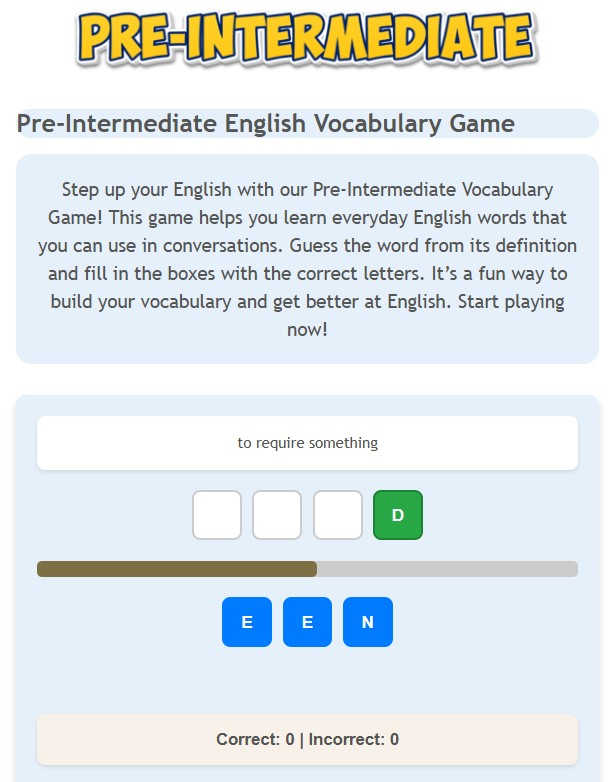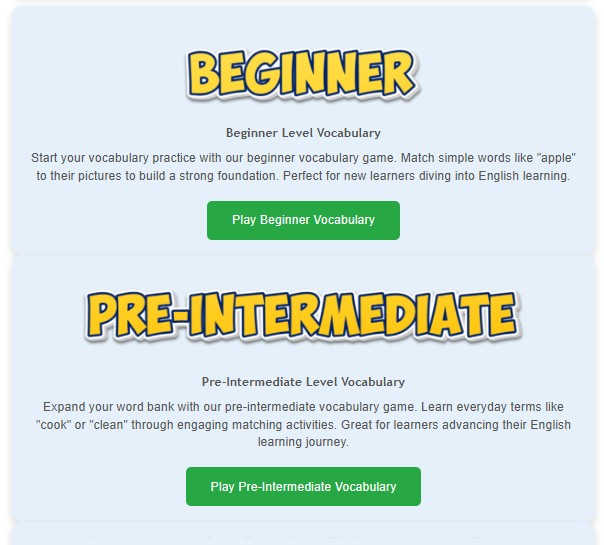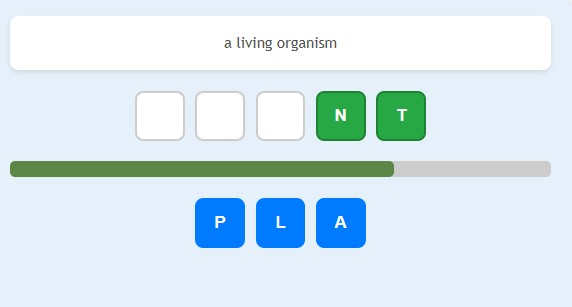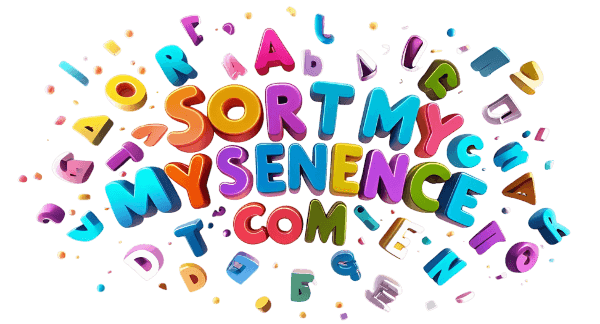
Vocabulary is the backbone of any language, and when it comes to learning English, it’s both the easiest and most challenging step. Why? Because while basic, everyday words like “hello” or “food” are quick to learn, mastering a rich and nuanced vocabulary takes time, effort, and dedication. Even native English speakers encounter unfamiliar words—often specialized terms used in specific fields like science, law, or technology—that can make a significant difference in communication. At Sort My Sentence, we’ve gamified the vocabulary learning process to make it engaging, effective, and fun for learners at every stage of their English journey. 📚
Why Vocabulary Matters in English Learning
A strong vocabulary is essential for expressing yourself clearly and understanding others. Whether you’re ordering coffee, writing an essay, or giving a presentation, the right words help you communicate with precision and confidence. A limited vocabulary, on the other hand, can leave you struggling to convey your thoughts or misinterpreting what you hear or read.
Interestingly, vocabulary isn’t just about quantity—it’s about quality. Knowing specialized or context-specific words can set you apart in professional or academic settings. For example, while a native speaker might rarely use words like “ameliorate” or “ubiquitous” in daily conversation, these terms can be game-changers in a formal report or discussion. Building a diverse vocabulary equips you to handle any situation, from casual chats to high-stakes meetings.
The Easy and Hard Parts of Vocabulary Learning

Vocabulary learning is a paradox: it’s both the easiest and hardest part of mastering English. The easy part? Starting with simple, high-frequency words. Beginners can quickly pick up words like “house,” “eat,” or “happy” and use them in everyday conversations. These foundational words form the building blocks of communication and boost confidence early on.
The hard part? Achieving mastery. As you progress, you encounter less common words, idioms, phrasal verbs, and field-specific jargon. For instance, understanding the difference between “affect” and “effect” or learning phrases like “beat around the bush” requires time and practice. Vocabulary learning is a lifelong journey, but every new word you learn brings you closer to fluency. No matter where you are in this process—beginner or advanced—consistent vocabulary practice is always beneficial.
How Sort My Sentence Makes Vocabulary Fun
At Sort My Sentence, we believe learning should be enjoyable, not tedious. That’s why we’ve transformed vocabulary practice into an interactive word sorting game. Our goal isn’t just about winning or losing—it’s about helping you improve and grow. Our vocabulary game challenges you to unscramble letters to form correct words based on their English definitions, turning learning into a puzzle-solving adventure. 🎮
Here’s how it works: You’re given a word’s definition and a set of scrambled letters. Some letters are already placed correctly in the answer boxes to give you a head start, depending on the word’s length. Your task is to drag and drop the remaining letters into the right order. Instant feedback—green for correct, red for incorrect—helps you learn from mistakes, and a hint button is available if you get stuck. This gamified approach keeps you engaged and motivated, making vocabulary practice feel like play, not work.
Vocabulary Levels for Every Learner
We’ve designed our vocabulary games to cater to learners at all stages, with five distinct levels and a special section for the Oxford 3000 word list. Whether you’re just starting out or aiming for mastery, you can jump into the level that suits you best:
- Beginner: Learn essential words like “apple” or “run” to build a strong foundation for everyday communication.
- Pre-Intermediate: Expand your vocabulary with words like “travel” or “clean” to handle common conversations with ease.
- Intermediate: Master words like “excited” or “decision” to express yourself more clearly and confidently.
- Upper-Intermediate: Tackle advanced terms like “analyze” or “strategy” for professional and academic settings.
- Advanced: Conquer nuanced vocabulary and idioms, such as “meticulous” or “cut to the chase,” for near-native fluency.
- Oxford 3000: Practice the 3,000 most essential English words curated by Oxford experts, perfect for exam prep (e.g., IELTS, TOEFL) or real-world fluency.
Not sure which level to start with? Try the Beginner level and work your way up, or test your skills at a higher level to find your sweet spot. Each level is designed to challenge you while keeping the experience rewarding.
Tips to Supercharge Your Vocabulary Learning

To make the most of your vocabulary practice with Sort My Sentence, try these practical tips:
- Use Words in Context: After learning a word, try using it in a sentence or conversation to make it stick.
- Practice Daily: Spend 10–15 minutes a day playing our vocabulary games to build steady progress.
- Keep a Vocabulary Notebook: Write down new words, their meanings, and example sentences for quick review.
- Explore Related Words: Learn synonyms, antonyms, or word families (e.g., “happy,” “happiness,” “unhappy”) to deepen your understanding.
- Combine with Other Resources: Pair our games with tools like the Oxford Dictionary to explore word pronunciations and usage.
By integrating these habits, you’ll not only expand your vocabulary but also gain the confidence to use new words in real-life situations.
Ready to Boost Your Vocabulary?
Vocabulary is the key to unlocking fluency in English, and Sort My Sentence makes the journey fun, interactive, and rewarding. Whether you’re learning basic words or mastering advanced terms, our gamified vocabulary games are here to support you every step of the way. Start exploring our Beginner level or dive into the Oxford 3000 list today!
Enjoyed this article? Share it with friends on social media to spread the word about mastering English vocabulary with Sort My Sentence! 📱
